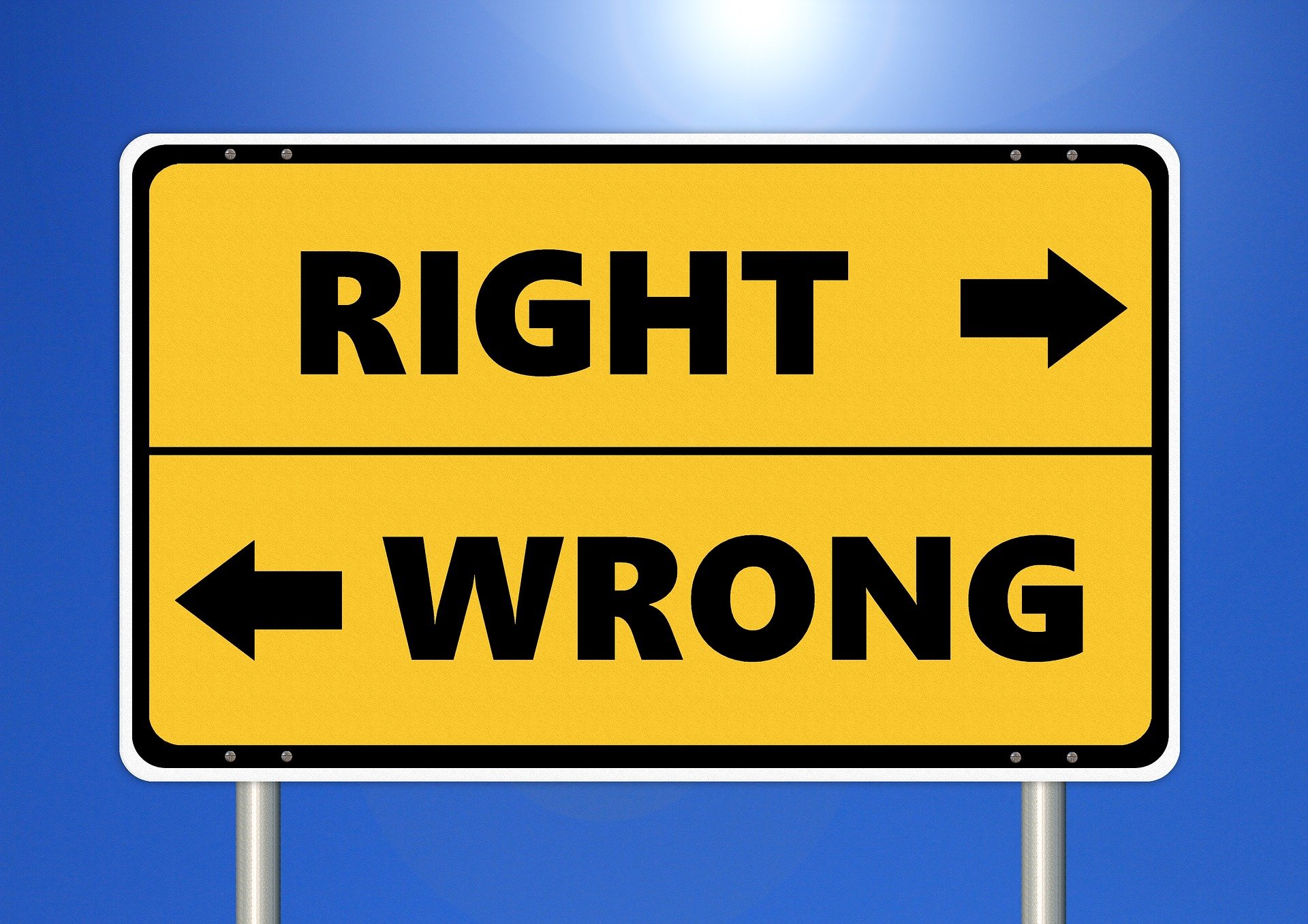Does Morality Point to God?
One morning, I sat looking out my window and noticed something that I had never seen before. A spider had caught a large fly in its web and was slowly making its way to its prey. The fly violently tried to escape, shaking the web, but to no avail. The spider eventually killed the fly, then slowly moved its newly caught meal up its web.
I had never before witnessed the entire process of a spider catching and killing its prey. The sight fascinated but also saddened me, as I watched the large fly fight for its life then slowly die.
I couldn’t help but make a parallel to the topic at hand. If God does not exist, and naturalism—the idea that nature is all that exists—is true, then what sets humans apart from insects and animals? Naturalism says we—like insects and animals—are merely the byproducts of a valueless, mindless process. So why are we morally outraged at a human kidnapping and killing another human, but we don’t see a moral problem with a spider doing the same thing to another insect?
Many of us affirm human value as a binding objective moral standard that applies to each human being, even if we do so unknowingly. But why? As one theologian put it, “We possess an in-built ‘yuck factor’—basic moral intuitions about the wrongness of torturing babies for fun, of raping, murdering, or abusing children.”1 We understand that these moral laws apply to all people, at all times. There is something intuitive about being human that places our actions in a different moral category than the actions of a spider.
Every time we make statements such as “Hey! That’s not fair!” or “That’s my wallet! Give it back!” we affirm our belief in objective moral standards that we expect other people to know about. Usually, the one who committed an offense resorts to arguing for why his action did not go against the standard or why she had a special excuse to disobey it. This “quarreling,” as the late philosopher C.S. Lewis put it, “means trying to show that the other man is in the wrong. And there would be no sense in trying to do that unless you and he had some sort of agreement as to what right and wrong are; just as there would be no sense in saying that a footballer had committed a foul unless there was some agreement about the rules of football.”2
Some may respond by claiming that this moral standard is not objective, but comes from a subjective societal agreement. This view, called conventionalism, claims you ought to do whatever your society collectively decides is morally right. This may sound appealing at first, for it exemplifies the spirit of “to each his own.” But there are significant problems with this view. What about when your society decides it’s morally right to purify the Aryan race by ridding it of Jews, or what about when your society decides African Americans should be enslaved for profit? Under this view, a society can never be immoral. One cannot claim that what the Nazis did was objectively morally wrong since German society deemed it morally right. In fact, this view prevents moral reformers: the righteous Gentiles that sacrificed themselves to save Jewish people acted immorally because they disobeyed what their society told them to do; likewise, Martin Luther King Jr. was morally wrong to stand up against the societal convention of slavery.3
Societies reflect the quality of the individuals who compose them. However, the Jewish prophet Jeremiah wrote, “The heart is deceitful above all things, and desperately sick; who can understand it?” (Jeremiah 17:9). What happens when a society full of individuals with unchecked, deceitful hearts decide upon public policy, laws, and moral standards? When humans are left to themselves to decide what’s right and wrong, we end up with unjust societal structures and laws. We cannot trust any human institution to be the basis of our morality, because human institutions consist of fallible, corruptible, and self-interested humans. Upon examination, we see that conventionalism falls apart. Thus, the standard for morality must lie outside us. So, where does this objective moral standard come from?
It can’t come from the material world, since matter doesn’t have moral properties.4 The naturalistic metaphysic fails to account for how human value and moral duties could emerge from a valueless, mindless process of unguided matter in motion.5 That is why the famous atheist biologist Richard Dawkins exclaims, “There is, at bottom, no design, no purpose, no evil, no good, nothing but pointless indifference.”6
But if objective moral values do indeed exist, then it is reasonable to believe that God exists and that morality is grounded in his very nature. Christian philosopher Paul Copan explains, “The more plausible metaphysical context for grounding human rights and dignity is this: we have been created with a moral constitution by a supremely valuable being, and we are ‘hard-wired’ to function properly by living morally, deeply relational lives.”7
Just as a musical recording is better the more it resembles the original live performance, our moral actions are better the more they resemble God’s nature.8 And God has expressed his nature to us through his moral commands in the Bible. Yeshua said, “You shall love the Lord your God with all your heart and with all your soul and with all your mind. This is the great and first commandment. And a second is like it: You shall love your neighbor as yourself. On these two commandments depend all the Law and the Prophets” (Matthew 22:37–40). The more we love God and love our neighbors, the more we resemble God’s character and acknowledge the moral law he has placed on our hearts.
Footnotes
- Paul Copan, “The Moral Argument,” in Christian Apologetics: An Anthology of Primary Sources, eds. Khaldoun A. Sweis and Chad V. Meister (Grand Rapids, MI: Zondervan, 2012), 175.
- C.S. Lewis, Mere Christianity in The Complete C.S. Lewis Signature Classics (New York: HarperCollins, 2002), 16.
- Francis J. Beckwith and Gregory Koukl, Relativism: Feet Firmly Planted in Mid-Air (Grand Rapids, MI: Baker Books, 1998).
- If this thought is perplexing, consider the distinction between the words “is” and “ought.” Observing the natural world can tell the observer what “is”—that which exists—but it cannot tell the observer what one “ought” to do. For example, one cannot observe the orbits of the planets and say that Jupiter ought to orbit the sun, only that Jupiter does orbit the sun. In the same way, one cannot observe brute nature and derive a law against adultery. All one can do is describe how, when a mate is taken by another suitor, certain psychological effects result. One cannot say that such effects are wrong, nor that the act of taking the mate is wrong, only that they happen.
- Copan, 176. Atheist neuroscientist Sam Harris has attempted to produce an explanation for how nature could produce objective moral duties. To read a summary and critique of his view, see William Lane Craig, “Navigating Sam Harris’ The Moral Landscape,” Reasonablefaith.org, https://www.reasonablefaith.org/writings/popular-writings/existence-nature-of-god/navigating-sam-harris-the-moral-landscape/.
- Richard Dawkins, River out of Eden: a Darwinian View of Life (New York: Basic Books, 1996), 133. Quoted in William Lane Craig, “Navigating Sam Harris’ The Moral Landscape.”
- Copan, 178.
- Drcraigvideos, “The Moral Argument,” January 21, 2015, https://www.youtube.com/watch?v=OxiAikEk2vU.



 Credit: Freepik
Credit: Freepik




